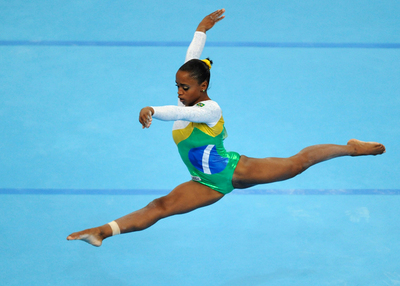 Text for Graphic Sports – Weekend Edition 15 apr 2005
Text for Graphic Sports – Weekend Edition 15 apr 2005
The African contribution to Brazilian Sports
Last time I wrote about the huge contribution of the people of African origin in Brazilian football. Their contribution is obviously not only restricted to football, but can be extended to many other sports in Brazil. They were responsible for the creation of a new modality in sports called capoeira.
During the Olympic Games 2004 in Athens it was possible to see that large part of the crew of athletes representing Brazil in the games is of Afro-Brazilian origin. Afro-Brazilians are present in the collective sports like volleyball and basketball, but also in individual modalities.
Brazilians are normally very proud of their athletes, especially if they are able to win a medal. During the last Century a lot of Afro-Brazilians became legends of sports. This is the case of a very important Afro-Brazilian called Joao Carlos de Oliveira, known as “Joao do Pulo”. His nickname means “John, the Jumper”. In the Panamerican Games in Mexico in 1975 he broke the world record with the mark of 17.89 meters. It was so impressive, that this jump remained for 10 years as the world record. In the same Games he also won the gold medal in the long jump (8.19m).
Years earlier, already Adhemar Ferreira da Silva, a former Brazilian cultural attaché in Nigeria, became famous when he broke several times the world record in the triple jump. In the same Olympic Games (1952) e. g. he broke the world record four times and raised the mark to 16.22 meters. He was from a poor family, a real symbol of achievement. He worked during the day, studied at night and trained during his lunch hour. The deserved reward were two gold medals in this category.
Joaquim Cruz, another Afro-Brazilian, won the Olympic gold medal on the track in the Olympic Games of Los Angeles 1984 with the new Olympic record of 1.43.0 in 800 meters. Nowadays we have a lot of new, very good Afro-Brazilian athletes, like the sprinter Wanderley Quirino and the celebrity Daiane dos Santos, elected in Brazil the Sports Women of the Year 2003. In the World Championship in the USA, she won the gold medal in Floor Exercises, with a sequence called “double twist carped”, called later “Dos Santos” by the International Federation of Gymnastic. In the World Cup in Germany, she surprised the world again with an even more difficult sequence, the “double twist extended”. She was a candidate for a gold medal in the Olympic Games 2004, but injuries interfered in the results and she ended as fifth best gymnast. Even though, a short time later, by the end of 2004, she was again Gymnastics World Champion.
In boxing we have today a man of Bahia called Acelino “Pop[MAS1] o” de Freitas. He is actually WBO lightweight world champion and still undefeated since the beginning of his career as a professional. In the past, Afro-Brazilians like Maguila were very famous. In Ghana you have a multi champion and legend of boxing, that doesn’t need any comments: Azumah Nelson, a Ghanaian and Tabom of Afro-Brazilian origin.
In spite of all the problems that athletic sports have, because the sponsorship of individual athletes in some modalities seems not to be of interest to big companies, the athletes can produce very good results. A lot of them are what we can call “half professionals”. Because of their condition as underpaid athletes they have other jobs to earn money. So they train e. g. in the early morning, during the day they work and go to evening classes to improve their educational level to have better professional perspectives after retirement as athletes. For these heroes of sport the Brazilians normally pay respect and admiration, because their story is a story of self-sacrifice, humility, passion and pride.
Capoeira, brought into Brazil by the Bantu people from Angola, was originally a kind of foot-boxing fight, a way of self defence. In Brazil, capoeira was transformed into a kind of sport-dance practised by two dancers that show figures of a fight in form of dance without touching each other. It is a sport with a lot of skill which requires a fit body condition and is always accompanied by Afro-Brazilian music of West African origin. The musicians and the other participants are in a circle around the dancers, singing and clapping hands.
When the Afro-Brazilians or even all the Brazilian athletes, independent of their origin, are taking part in a competition or a tournament, they show their typical superstition, combining Christian prayers and the sign of the cross with African fetishist rituals to protect their body against injuries and to help them to win the fight against their opponents in the competitions.
Marco Aurelio Schaumloeffel
Brazilian Lecturer in Ghana
Picture “daiane.jpg”: The World Champion Daiane dos Santos